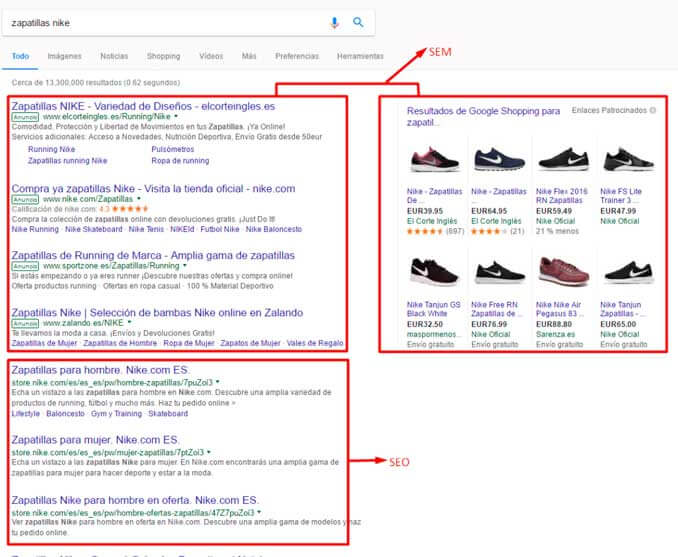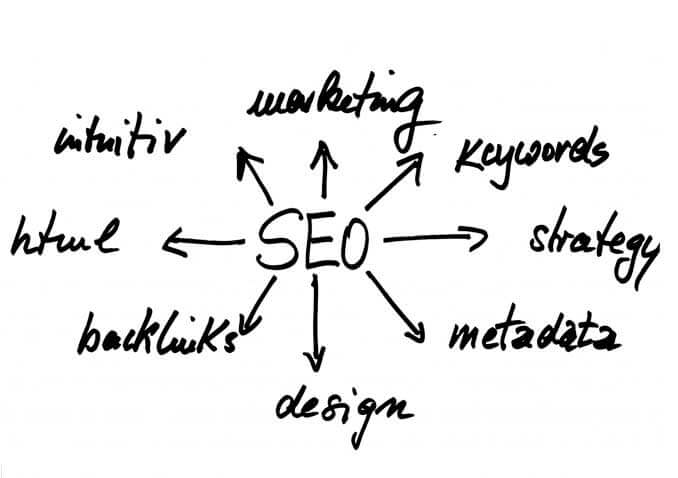SEO (Search Engine Optimization) is translated into the language of Cervantes as web positioning, i.e. the optimization of a website for Internet search engines.
Since the creation of Wandex at the beginning of the 90s, many search engines have passed through our lives. But if one has had a special impact it has been Google, created in 1996 by Larry Page and Sergry Brin.
With the boom of web pages, people understood their usefulness as a sales tool and the struggle to occupy the top positions in search engines began, or in other words, the birth of SEO.

What is SEO?
SEO refers to organic search results, i.e. those that are not advertising and are paid by an advertiser to appear in the header or side part of the search engine in question. This is SEM, which we will talk about later.
The task of the workers in this discipline consists of improving the visibility of the web so that it appears naturally in the first positions of the search engines. This task has been increasing its importance exponentially in recent years.
The SEO specialist must find the keywords that best represent the website to its target audience.
Key SEO factors
The positioning of a page is determined by a multitude of factors, but there are two that are particularly important.
On the one hand, what is known as authority. The more valuable the information a website contains, the more popular it will be among users. By having valuable content it will be shared and this is very positive for search engines.
The other main factor for SEO optimization is relevance, which defines the relationship of a given page to the search performed by the user.

SEO On Page
SEO is divided into two main modalities, SEO On Page and SEO Off Page.
SEO On Page refers to the factors of a web page that the search engine takes into account to position it. It is closely related to the relevance of the page.
Within the fundamental aspects that are worked in the SEO On Page, the content has special importance, its quality and relevance determine whether or not we are among the searches of users. Related to the above is the optimization of keywords, for which we want to be found.
Among the technical aspects related to this type of SEO is the loading time of the page, the navigability of the web to cause a positive user experience, as well as the optimization of the code with which it has been created.
SEO Off Page
It focuses on issues external to the website itself and the work on it is based on developing a strategy focused on obtaining quality links to our website. Unlike the previous one, all the tasks are performed outside our website.
It is not enough to accumulate or buy a huge number of links. These links must be relevant and the more authority the page they come from has, the better for our site. Social Networks have great relevance here, as they help to “move” and position the content with great agility.
One of the most controversial techniques in this category is known as linkbuilding, which basically consists of getting relevant blogs and websites to link to us. This can be done by establishing a win-win relationship with the administrators of these pages, for the exchange of links and articles.
On the other hand, there are some unethical linkbuilding practices, known as Black Hot SEO. A technique that is penalized by search engines and that consists in the automatic generation of links with very questionable methods.

How do search engines work?
Also known as search engines, they are a computer system that searches for files stored on web servers. But how do they do it?
Basically in two phases:
Crawling: the well-known bots go through the links of a website and from there they jump to others to gather information (hence the vital importance of having an optimal link structure). Bots are very attracted to new sites and changes made to existing pages.
They are configured to choose the amount of time they spend on each site. If the loading time is excessive and you don’t have updated content, they will crawl elsewhere.
Indexing: after the previous task the robots make an index with the information collected from all the crawled web pages.
The information is categorized according to its content, authority and relevance. The ultimate goal is for each search to obtain a result as close as possible to the query being made.
At the dawn of the Internet, robots only took into account the repetition of terms to rank higher. Their priority has changed and now they look at the quality of the content, as well as the inclusion of images, videos, animations… etc.
After these two phases, the ALGORITHM comes into operation, a computer process that is responsible for deciding which pages appear before or after in the search results, based on the data obtained in the crawling and indexing.

The important thing, why do I need SEO?
If with all the above you are still not convinced that SEO is nowadays vital to sell products and services through the Internet, now we are going to give you some figures and arguments that prove its importance.
A page with optimal SEO is not only more useful for search engines, but also for your users. For example, if you are looking for sneakers, you want to find that item fast.
Every hour around 1.5 million searches are performed worldwide. Of all of them about 70% of clicks are made in the organic results, to this you must add that almost three quarters of users do not go to the second page of the search engine. In short, if you are not among the first five links of the search engine in question, it is as if you do not exist for the vast majority of users.
Do you know what is the best way to be well positioned at the top? SEO optimization of your website. If there is a search where your page is relevant, you must be there or you will lose a potential customer.

